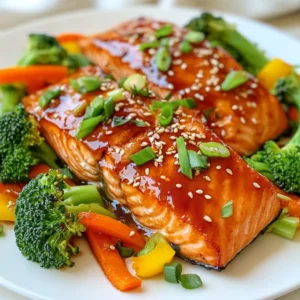
Teriyaki Glazed Salmon with Veggie Medley
A delicious salmon dish glazed with teriyaki sauce, served with a colorful medley of vegetables.
Ingredients
- 4 fillets salmon
- 0.25 cup soy sauce (low sodium)
- 0.25 cup honey
- 2 tablespoons rice vinegar
- 2 teaspoons sesame oil
- 1 tablespoon fresh ginger, grated
- 2 cloves garlic, minced
- 2 cups broccoli florets
- 1 bell pepper sliced (any color)
- 1 medium carrot, thinly sliced
- 1 tablespoon olive oil
- to taste salt and pepper
- for garnish sesame seeds
- for garnish chopped green onions
Instructions
- Preheat your oven to 400°F (200°C). Line a sheet pan with parchment paper for easy cleanup.
- In a small saucepan, combine soy sauce, honey, rice vinegar, sesame oil, grated ginger, and minced garlic. Heat over medium heat for about 5 minutes, stirring frequently, until the sauce thickens slightly. Remove from heat and set aside.
- In a large bowl, toss the broccoli florets, sliced bell pepper, and carrot with olive oil. Season with salt and pepper to taste.
- Arrange the seasoned vegetables on one side of the prepared sheet pan. Place the salmon fillets on the other side, skin-side down.
- Brush the teriyaki sauce over the salmon fillets generously, reserving some of the sauce for later.
- Place the sheet pan in the oven and bake for 15-20 minutes, or until the salmon is cooked through (internal temperature should reach 145°F or 63°C) and the vegetables are tender, but still crisp.
- Once done, remove the pan from the oven, and brush the salmon with the remaining teriyaki sauce.
- Transfer the salmon and veggies to plates, garnishing with sesame seeds and chopped green onions. Drizzle with additional teriyaki sauce if desired.
Notes
For a spicier kick, add red pepper flakes to the teriyaki sauce.